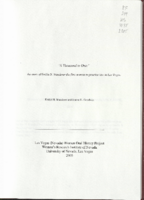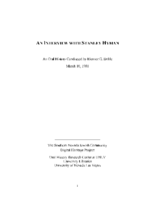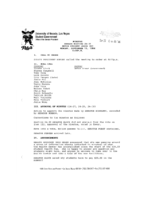Search the Special Collections and Archives Portal
Search Results

Transcript of interview with Lilly Fong by Annie Yuk-Siu Shum, February 29, 1980
Date
Archival Collection
Description
Text

Transcript of interview with Robert D. Howell by Joe Sant, February 26, 1977
Date
Archival Collection
Description
On February 26, 1977, collector Joe Sant interviewed local Nevadan business owner, Robert D. Howell (born November 22nd, 1939 in Las Vegas, Nevada) in his home in Las Vegas, Nevada. This interview covers Las Vegas in the old days, from Mr. Howell’s personal experience of being born and raised in Nevada. During this interview, Mr. Howell also discusses the early above ground atomic tests, local environmental and social changes, the economic landscape, the Mormon Fort, religious beliefs, and local recreation. The interview concludes with discussion on air pollution.
Text

Transcript of interview with Emilie Wanderer by Joanne Goodwin, 2000
Date
Archival Collection
Description
Emilie Wanderer was the first woman to establish a law practice in Las Vegas. She also helped to start a family court in Nevada with a social worker and a marriage counselor on staff. She and her son John were the first mother-son team to practice law in Nevada.
Text

Transcript of interview with Stanley Hyman by Eleanor Doble, March 10, 1981
Date
Archival Collection
Description
Interview with Stanley Hyman by Eleanor Doble on March 10, 1981. In this interview, Hyman discusses his job as a district manager for Farmers Insurance group, which brought him to Reno, Nevada in the 1940s, then to Las Vegas in 1951. He talks about the population growth of Las Vegas, and comments that the infrastructure of the city did not improve with the population growth. He also talks about some local disasters, the economy, entertainment, and the convention business in the area. He speaks briefly about recreation at Lake Mead and Mount Charleston, and atomic tests. The interviewer asks about women in leadership positions in hotels and in the insurance business.
Text

Transcript of a narrative by Lucile Bunker, March 10, 1977
Date
Archival Collection
Description
Text

Transcript of interview with Lawrence Hawley by Andy Sturgeon, March 13, 1981
Date
Archival Collection
Description
On March 13, 1981, Andy Sturgeon interviewed attorney Lawrence Hawley in his office on 302 East Carson Street, Las Vegas, Nevada. The two discuss how Hawley first came to Nevada, as well as his personal family history. Hawley describes Hoover Dam as it was being built, the effects of the Depression on Nevada, and how Las Vegas has grown in size. Hawley also discusses liquor laws and how practicing law has changed since he first moved to Nevada.
Text

Transcript of interview with Don Hayden by Steven Cohen, March 1, 1979
Date
Description
On March 1, 1979, collector Steven Cohen interviewed school administrator, Don Hayden (born in Ogden, Utah) in his home in Las Vegas, Nevada. This interview offers a historical overview of the education system in Nevada. Don also discusses gambling, the early atomic tests, the first hospitals built in Las Vegas, and offers his own personal account on home and family life in Nevada.
Text

Edith Leavitt interview, February 7, 1977: transcript
Date
Archival Collection
Description
On February 7, 1977, collector Enrico Messina interviewed Edith Leavitt (born April 12th, 1924, in St. George, Utah) at her home in Las Vegas, Nevada. In this interview, Mrs. Leavitt talks about teaching in Southern Nevada, including in the Virgin Valley and in Las Vegas. She also discusses the changing education system in Southern Nevada during her time as an educator.
Text

Jack K. Leavitt interview, February 28, 1979: transcript
Date
Archival Collection
Description
On February 28, 1979, collector Alick Dziabczenko interviewed Jack Leavitt in Las Vegas, Nevada. In this interview Mr. Leavitt talks about his childhood in Las Vegas. He also talks about his family life and his career in the city, as well as some of the many changes he has seen in Las Vegas.
Text

Meeting minutes for Consolidated Student Senate University of Nevada, Las Vegas, September 19, 1994
Date
Archival Collection
Description
Text
